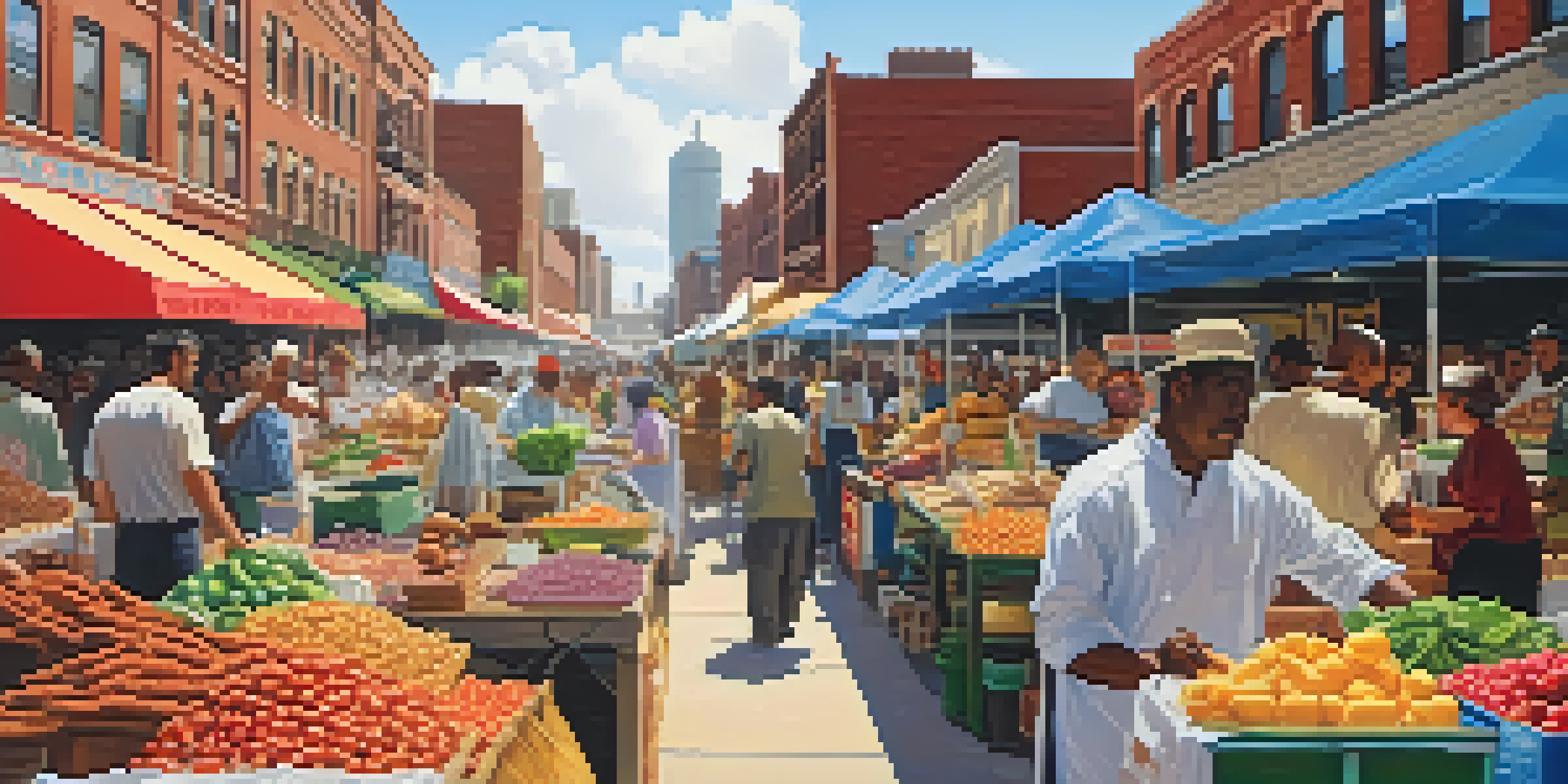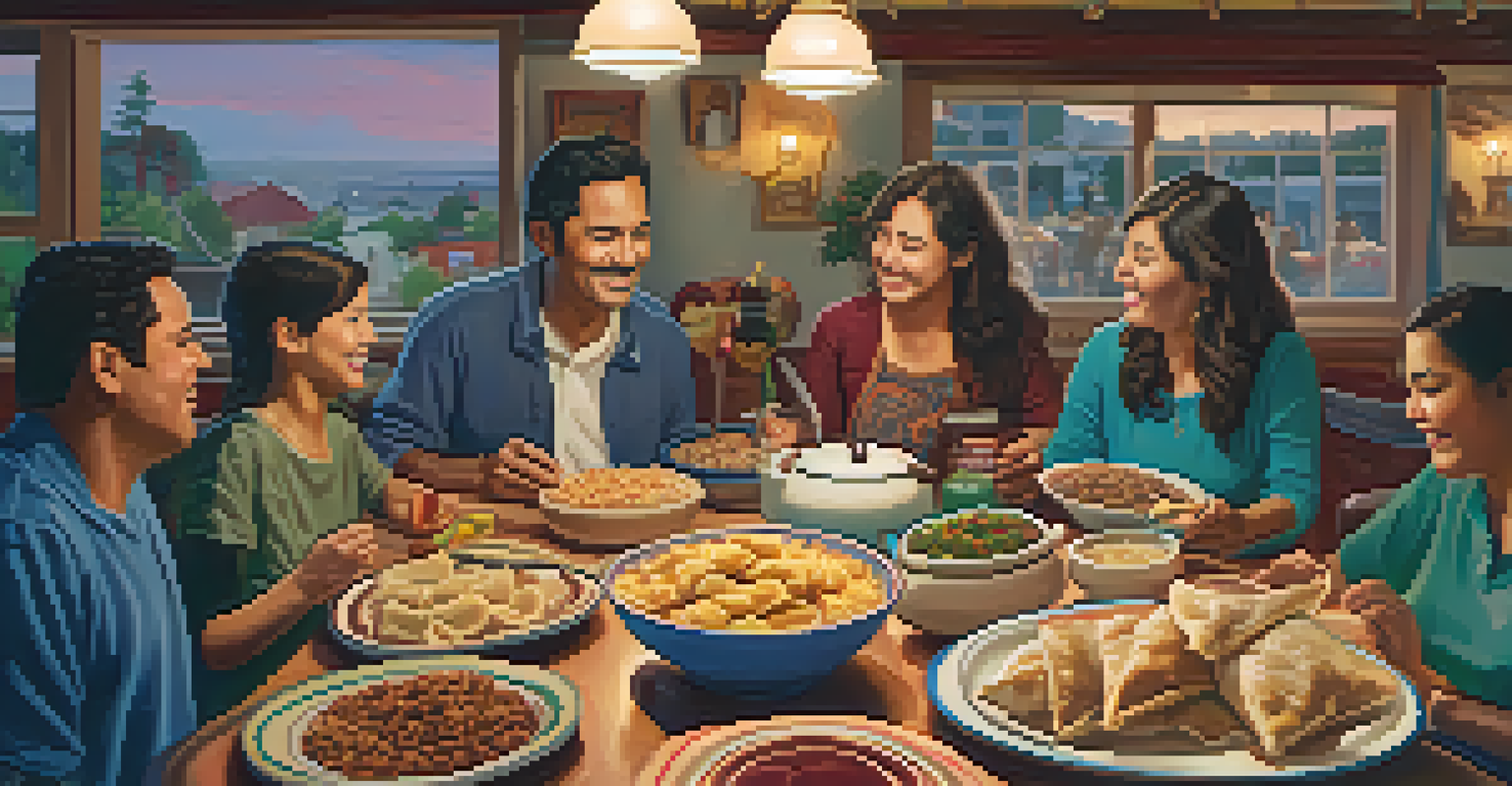The Food Scene: How Immigrant Cultures Flavor Detroit's Cuisine

The Melting Pot: Detroit's Culinary Heritage
Detroit's food scene is a vibrant tapestry woven from various immigrant cultures. Each group has contributed unique flavors, techniques, and dishes that reflect their heritage. This culinary melting pot not only enhances the city’s dining options but also tells the story of its diverse population.
Food is our common ground, a universal experience.
From Polish pierogis to Lebanese shawarma, these dishes have become staples in local restaurants and homes. They represent the journeys of people who have come to Detroit, bringing their culinary traditions with them. As a result, the city's food landscape is a celebration of global flavors.
The blending of these diverse cuisines creates a rich, multicultural experience for diners. It invites everyone to explore new tastes and appreciate the stories behind the food. This shared culinary journey fosters a sense of community and belonging among Detroit's residents.
Iconic Dishes Born from Immigrant Influence
Some of Detroit's most iconic dishes are direct results of its immigrant communities. Take the beloved Detroit-style pizza, which has Italian roots, or the famous coney dog, a staple that reflects Greek and Turkish influences. Each bite encapsulates a piece of history and culture.

Moreover, the rise of food trucks and pop-up restaurants has allowed chefs to showcase their unique backgrounds. They often blend traditional recipes with contemporary twists, creating exciting fusion dishes that surprise and delight the palate. This innovation keeps the food scene fresh and dynamic.
Diverse Culinary Heritage in Detroit
Detroit's food scene is a vibrant mix of immigrant cultures, creating a unique tapestry of flavors and traditions.
These iconic dishes not only satisfy cravings but also serve as conversation starters. They invite locals and visitors alike to share their experiences and memories related to food, further enriching the communal aspect of dining in Detroit. It's a delicious way to connect with the city’s heritage.
Celebrating Festivals: A Taste of Culture
Detroit's numerous food festivals are a testament to the city’s rich cultural diversity. Events like the Detroit Ethnic Festival and the Detroit Food Truck Rally showcase the culinary talents of immigrant communities. They provide an opportunity for everyone to taste a variety of flavors from around the world.
Cooking is like love. It should be entered into with abandon or not at all.
These festivals not only highlight traditional dishes but also celebrate the cultural significance behind them. For instance, visitors can learn about the origins of spices used in Indian curries or the rituals associated with preparing Mexican tamales. It’s a feast for the senses and the mind.
By participating in these events, attendees can forge connections with others, fostering understanding and appreciation for different cultures. Food has a unique way of breaking down barriers, and these festivals are a perfect example of how shared experiences can create unity within diversity.
Community and Family: Recipes Handed Down Through Generations
For many immigrant families in Detroit, cooking is a cherished tradition that binds generations together. Recipes are often passed down from grandparents to parents to children, creating a sense of continuity and belonging. These dishes carry stories, memories, and love.
Many local restaurants proudly feature family recipes that have been refined over the years. This authenticity not only appeals to the taste buds but also resonates with diners seeking genuine cultural experiences. It’s like stepping into someone’s home and enjoying a meal made with care.
Iconic Dishes Reflect Cultural Roots
Many of Detroit's beloved dishes, like Detroit-style pizza and coney dogs, are shaped by the culinary influences of its immigrant communities.
These culinary traditions also inspire community gatherings and events, where families come together to share food and stories. Such gatherings reinforce the importance of heritage and foster a sense of identity among community members. In this way, food becomes a bridge connecting the past to the present.
The Role of Immigrant Chefs in Detroit’s Kitchen
Immigrant chefs are at the forefront of Detroit's culinary renaissance, infusing creativity and authenticity into the local food scene. Many of them have opened restaurants that reflect their cultural backgrounds while also appealing to a broader audience. This has transformed the dining landscape of the city.
These chefs often draw on their experiences and traditions to create innovative dishes that pay homage to their roots. They blend familiar flavors with local ingredients, resulting in exciting menus that cater to diverse palates. This creativity not only attracts food lovers but also highlights the chefs' skills and stories.
Moreover, their presence in the kitchen fosters a sense of cultural exchange, as they introduce diners to new flavors and cooking techniques. This interaction not only enriches the culinary scene but also promotes understanding and appreciation for different cultures. The chefs become ambassadors of their heritage through the food they create.
Local Markets: A Hub for Global Flavors
Detroit's local markets serve as vibrant hubs where immigrant communities share their culinary treasures. These markets offer a wide array of ingredients, spices, and prepared foods that reflect the city’s cultural diversity. It’s a place where one can embark on a global culinary adventure without leaving the neighborhood.
Shops and stalls often feature products from local farmers and producers, emphasizing the importance of supporting the community. Visitors can find everything from fresh produce to specialty items like Middle Eastern za'atar or Polish kabanos. This accessibility encourages home cooks to experiment with global flavors.
Community and Tradition Through Food
Food serves as a bridge connecting generations, with immigrant families sharing recipes that foster a sense of belonging and identity.
Additionally, these markets often host cooking classes and demonstrations, allowing culinary enthusiasts to learn directly from those who have mastered traditional techniques. This hands-on experience fosters a deeper appreciation for the food and the cultures behind it. Local markets truly embody the spirit of community and culinary exploration.
The Future of Detroit’s Culinary Landscape
As Detroit continues to evolve, so does its culinary landscape. The influence of immigrant cultures is expected to grow, bringing even more diverse flavors and dining experiences to the city. This evolution is a reflection of the city’s ongoing transformation and resilience.
New restaurants and food concepts are emerging, driven by the passion of both established and aspiring chefs. These culinary innovators are not only preserving traditional recipes but also experimenting with fusion and contemporary approaches. This dynamic environment keeps the food scene lively and enticing.

Additionally, as more people become aware of the importance of sustainable and locally sourced ingredients, we can expect a shift towards greater collaboration among local producers and immigrant chefs. This synergy will not only enhance the quality of food but also strengthen community bonds, ensuring that Detroit’s culinary future remains bright and flavorful.